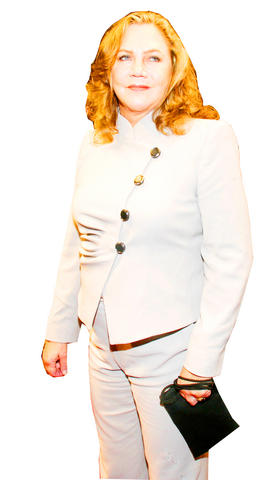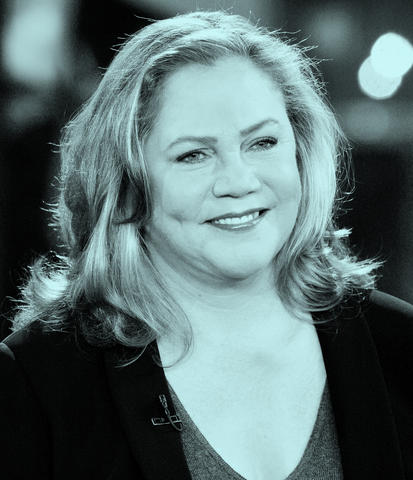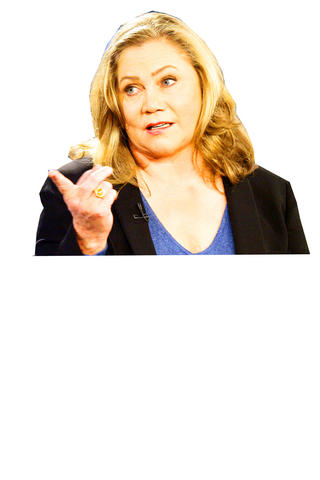The standard response to Kathleen Turner, sexpot and movie star turned much-praised stage actor, is to remark on how amazingly normal and unHollywood she is. She drinks, she smokes, she swears; the day I meet her, she eats a hefty BLT without even so much as a hint of mayo-induced panic. She does her own supermarket shop and flags down her own taxis. She speaks five languages, talks about politics and sex with a frankness and intensity that is positively Parisian and has been known to read, well, books.
Most amazingly, she has had no cosmetic surgery nor even, it seems, a surreptitious lunchtime squirt of Botox (you can tell that she's telling the truth about her face; ask if she has ever been tempted by the knife or the needle, and she doesn't launch into the smokescreen of a pseudo-feminist tirade, she simply rolls her eyes, raises an eyebrow, and says sardonically: "Urr, Ye-es!")
How, then, to explain her new book Send Yourself Roses? Not only is it breathless, cheesy, badly written and full of ropey cracker-barrel wit trying to pass itself off as deep insight; it's also suffering from an identity crisis. Is it memoir, or self-help? Turner writes early on that when her friend and co-author, Gloria Feldt, told her that she should write an autobiography, the idea did not appeal: it seemed "egotistical." Slowly, though, the thought occurred that she might have something to offer other women.

PHOTOS: AP AND AFP
"I am 53," she says, when I ask about this change of heart. "We are the first generation of women who are financially independent. Our mothers didn't have their own resources like we do and once the daily child-rearing is over - once the child moves out of the house - instead of [women] feeling useless or whatever, there is this wave of creativity. Women are going back to work. They're reinventing themselves. I thought I could support that, even increase that. So it has got a lot of philosophy in it and a lot of my beliefs."
The long and short of this "philosophy" is what we can learn from her career and, specifically, from the inspirational (or not) characters she has played. Most chapters contain a box in which she summarizes the plot of a film or play, lists its cast and quotes a line by her character. This works better in some places than others. For instance, when she quotes Martha in Who's Afraid of Virginia Woolf? - "I'm loud and I'm vulgar, and I wear the pants in this house because somebody's got to, but I am not a monster" - you do feel (if you can temporarily forget how drunk Martha mostly is) a certain sense of girl power. Ditto murderous Matty, whom she played in the 1981 movie Body Heat: "You aren't too smart. I like that in a man." But when she is reduced to quoting Joan Wilder, the romantic novelist in Romancing the Stone and The Jewel of the Nile ("Exotic ports, great parties, spectacular sunsets - it's not enough!") or Joanna Crane/China Blue, the sportswear designer-cum-hooker who is the dubious star of Ken Russell's Crimes of Passion ("B movies have always been my inspiration"), you start to feel at sea. Eat your heart out, Simone de Beauvoir. Add to this her chapter titles - Banish the Yet; Separate the Real from the Reel; Take the Lead, Lady! - and the effect is akin to being slapped briskly round the face with a copy of Variety.
But perhaps Send Yourself Roses is an aberration. Though she seems pleased with it (the book moved her mother to tears, in a good way), she doesn't go on about it; my guess is that the motivational-speak was mostly a way to bank a fat publishing check without spilling too many beans. Not that she has many beans to spill. Turner has just divorced her husband Jay Weiss, a property developer, after 20 years of utterly faithful marriage and they still have lunch every week. "We're best friends. The week our divorce became final in December, he wrote me a little note: 'You are, and always will be, my best friend.' It's nice."

PHOTOS: AP AND AFP
In her book, she describes losing her virginity aged 19 in the van of a visiting performer to the Southwest Missouri State University campus, where she was in the theater department. "Afterward, I thought, well, that's not much of anything." She also admits that she once fleetingly believed herself to be in love with Michael Douglas, her co-star in Romancing the Stone, only nothing happened because he was married to his first wife Diandra. But that's about it as far as trailer-hopping goes.
Of her leading men, she has a go at Burt Reynolds (sexist pig) and Nicolas Cage (bad manners) but, mostly, she liked them and enjoyed wholly professional relationships with them. William Hurt, Jack Nicholson, Charles Durning: all gents. Predatory Hollywood let her be. "Very much because I am a good girl, and very much because I am not anybody's property. I was, like, don't even think about it!" She shudders.
We are in a restaurant near her home on the Upper West Side in New York, where the dining room's dainty proportions only emphasize her height and broad build. Turner is a big woman: strong-looking and, her blond hair falling on to her sweater, rather leonine. The famous voice, mineshaft deep and smoky as a back-room bar, is loud and determined, calling attention to itself as she strides towards our table. The body, as she is the first to admit, has changed a lot over the years - mostly because, in 1994, she developed rheumatoid arthritis, an illness that she has battled ever since - but the voice stays the same. She still looks fabulous, but it is a different kind of fabulous so, while eyes adjust, she makes it - the voice - her calling card and doesn't worry much about volume.

PHOTOS: AP AND AFP
This is a busy time for her. She has directed a production of Beth Henley's Pulitzer-prize winning play, Crimes of the Heart, which is about to open off Broadway (it has since done so, to moderately good reviews). Meanwhile, she is sending out feelers about which role she will next play on stage (people mention Princess in Tennessee Williams' Sweet Bird of Youth, but, after Martha in Who's Afraid?, whom she played for three years in all, she needs a break from trouble and strife).
She used to turn down plenty of work. Was that scary? "No, I've always been ridiculously blunt about that stuff. People say I'm naive and perhaps I am. But the good work comes along in the end. You're known for what you don't do as much as what you do: being able to exercise a 'no' is the most essential power that you have." Did she still say "no" now? A sarcastic laugh. "Not often. They still can't tell the difference between a woman who is no longer a sex symbol, and an older woman who is powerful and sexy." This timidity mystifies her because, when she stripped for her part as Mrs Robinson in the stage play of The Graduate, she was already 48. "We're such hypocrites. We use naked women to sell everything, but we still don't talk about sex, and we certainly don't discuss older women and sex."
Her reluctance to go the facelift route is due in part to her hunch that, with a face like hers, it would look too obvious; but it also has a lot to do with the fact that her arthritis has put simple vanity into perspective.
Turner grew up in Canada, Venezuela and London because her father, whom she adored, was in the foreign service. When she was 17, however, he died suddenly and her mother took her four children back to their grandparents in Springfield, Missouri. Turner hated it: she thought she would die of boredom and slept with her return ticket to London under her pillow. Escape finally came when she was offered the opportunity to finish her theater studies course at the University of Maryland in Baltimore. In 1977, she graduated and promptly set off for New York, where she worked as a waitress while she went up for auditions. It wasn't long before she had a regular gig in a daytime soap The Doctors.
Two years later, she auditioned for the role that made her famous: Matty in Body Heat. "My daughter [Rachel, who is at now at university] only saw it for the first time last year. She said I was so hot!" This is certainly so, but it was a mixed blessing. "The sex in that film was groundbreaking. But suddenly I was the new girl in town. I very quickly learned to drive myself everywhere." Why? "Because in LA you can't walk, you can't take taxis. So if someone doesn't want to leave, to take you back to your hotel, you're stuck. It was all very flattering, but it was scary, too." Is that why she didn't marry another actor? "I was never going to marry an actor. I have never seen an actor walk past a mirror without checking himself out. Who needs two of those in a family?"
She met Jay when she was trying to buy an apartment. He proposed in the middle of Second Avenue on one knee; their daughter was born four years later. Weiss coped well with being Mr Turner.
As she was completing work on John Waters' Serial Mom in 1994, her body packed up on her. Literally. She saw a specialist, was prescribed steroids and her weight ballooned. Finally, she saw a doctor who told her to exercise. This she did, though it was agony, and it helped. Gradually, using pilates, the gym and surgery when things get really desperate, she has got her arthritis under control. Is she in pain now? "Yes, but it's not acute. It's a question of putting up with it."
So now, at 53, she finds herself with a different kind of career. Illness being taboo in Hollywood, she has returned to her first love, the theater - and is single to boot.
Is she an intimidating prospect? "It's my voice; I don't think it's me. I'm a pussycat. I would love to have a man take care of me." She raises her voice a few notes: "Will you take it off my hands, darling? Will you find out which restaurant we're going to?" But let's be clear: she is not complaining. She has her friends, her family, her work. Which reminds her - she has a meeting to attend. Moments later, she is gone.

From the last quarter of 2001, research shows that real housing prices nearly tripled (before a 2012 law to enforce housing price registration, researchers tracked a few large real estate firms to estimate housing price behavior). Incomes have not kept pace, though this has not yet led to defaults. Instead, an increasing chunk of household income goes to mortgage payments. This suggests that even if incomes grow, the mortgage squeeze will still make voters feel like their paychecks won’t stretch to cover expenses. The housing price rises in the last two decades are now driving higher rents. The rental market

July 21 to July 27 If the “Taiwan Independence Association” (TIA) incident had happened four years earlier, it probably wouldn’t have caused much of an uproar. But the arrest of four young suspected independence activists in the early hours of May 9, 1991, sparked outrage, with many denouncing it as a return to the White Terror — a time when anyone could be detained for suspected seditious activity. Not only had martial law been lifted in 1987, just days earlier on May 1, the government had abolished the Temporary Provisions Effective During the Period of National Mobilization for Suppression of the Communist

Hualien lawmaker Fu Kun-chi (傅崐萁) is the prime target of the recall campaigns. They want to bring him and everything he represents crashing down. This is an existential test for Fu and a critical symbolic test for the campaigners. It is also a crucial test for both the Chinese Nationalist Party (KMT) and a personal one for party Chairman Eric Chu (朱立倫). Why is Fu such a lightning rod? LOCAL LORD At the dawn of the 2020s, Fu, running as an independent candidate, beat incumbent Democratic Progressive Party (DPP) lawmaker Hsiao Bi-khim (蕭美琴) and a KMT candidate to return to the legislature representing

Fifty-five years ago, a .25-caliber Beretta fired in the revolving door of New York’s Plaza Hotel set Taiwan on an unexpected path to democracy. As Chinese military incursions intensify today, a new documentary, When the Spring Rain Falls (春雨424), revisits that 1970 assassination attempt on then-vice premier Chiang Ching-kuo (蔣經國). Director Sylvia Feng (馮賢賢) raises the question Taiwan faces under existential threat: “How do we safeguard our fragile democracy and precious freedom?” ASSASSINATION After its retreat to Taiwan in 1949, the Chinese Nationalist Party (KMT) regime under Chiang Kai-shek (蔣介石) imposed a ruthless military rule, crushing democratic aspirations and kidnapping dissidents from